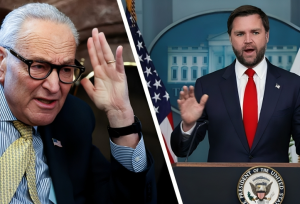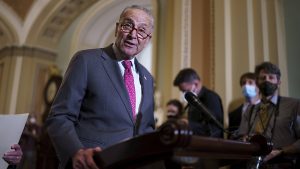House Speaker Mike Johnson revealed this week that the House of Representatives is preparing to hold a highly anticipated vote to compel the full release of federal documents related to the late financier and convicted sex offender Jeffrey Epstein. The vote, which lawmakers have debated for months, would require the Department of Justice to turn over long-sealed investigative materials to Congress and, eventually, to the public.
The renewed push to release the documents follows the end of the 43-day federal government shutdown. With Congress returning to Capitol Hill, Johnson told reporters Wednesday that the House is now ready to act on the bipartisan bill forcing transparency.
“We’re going to put that on the floor for a full vote when we get back next week,” Johnson said, according to Newsweek, adding that the House Oversight Committee has been “working around the clock” as part of its own Epstein review.
The announcement signals a significant step forward in what has become one of the most politically charged transparency battles in recent congressional memory. Lawmakers in both parties — particularly libertarian-leaning Republicans and progressive Democrats — have argued that the Department of Justice has withheld information for far too long regarding Epstein’s decades-long trafficking network and the powerful individuals who associated with him.
A Discharge Petition Forces Congress to Act
The bill in question was introduced in early September by Rep. Thomas Massie (R-Ky.) and Rep. Ro Khanna (D-Calif.). Largely ignored at first by House leadership, the legislation gained traction only after its sponsors pursued a rarely used tactic: a discharge petition.
A discharge petition allows rank-and-file lawmakers to bypass leadership and force a floor vote if they gather at least 218 signatures — a majority of the full House. Achieving that number is notoriously difficult, but supporters of the Epstein transparency effort claimed their cause had bipartisan moral urgency behind it.
After weeks of pressure campaigns, public criticism, and back-channel negotiations, the petition finally crossed the 218-signature threshold on Wednesday. The decisive signature came from Arizona Democrat Adelita Grijalva, who was sworn in earlier in the day following her victory in a September special election.
Khanna said earlier this week that a floor vote could occur “by early December.” Johnson’s announcement suggests the timeline may be significantly accelerated.
“If we get an overwhelming vote,” Khanna told CNN, “it will push the Senate, and it will push for a release of the files from the Justice Department.”
https://twitter.com/timburchett/status/1989318006648836361
What’s Actually in the Files?
The Department of Justice currently holds substantial archival materials related to its investigations of Epstein and his network over a period spanning decades. Those include:
-
investigative reports
-
communications related to Epstein’s plea deal in 2008
-
correspondence between agencies
-
potential references to associates, acquaintances, or visitors
-
sealed interviews and testimony
There is no public inventory of what the documents contain — a point of frustration for lawmakers and the public alike. Many Democrats and Republicans argue that the government’s lack of transparency has fueled speculation about who may have interacted with Epstein and in what context.
Supporters of the bill stress that releasing these materials is not intended to target any specific individual, but rather to eliminate rumors by making records public.
Democrats Release 23,000 Epstein Estate Pages
The push for transparency intensified this week when House Democrats released 23,000 pages of documents turned over by Epstein’s estate. These materials included emails, scheduling details, and references to many individuals in political and social circles.
Among those referenced was former President Donald Trump. The documents include mentions of Trump from the early 2000s, but none showed evidence of criminal wrongdoing, and Trump has repeatedly denied any involvement in Epstein’s illegal activities — calling the continued speculation a “political hoax.”
To date, no investigation has ever established that Trump engaged in illegal activity with minors, and journalists have not uncovered evidence contradicting his denial.
The new tranche of estate documents renewed public curiosity and increased pressure on Congress to act.
The Shutdown Battle and Internal GOP Tensions
The dispute over the Epstein files even contributed to the early August recess and intensified tensions within the Republican Party, particularly between Speaker Johnson and members of the populist faction.
Rep. Tim Burchett (R-Tenn.) expressed outrage earlier this week, claiming that Democrats refused to go along with his unanimous consent motion to release all the documents immediately.
“I don’t know what they’re hiding,” Burchett said, though he did not provide evidence that any member of Congress was seeking to suppress information.
Despite the political turbulence, the issue has drawn rare bipartisan alignment. Only four Republicans signed the discharge petition — Massie, Marjorie Taylor Greene, Nancy Mace, and Lauren Boebert — but many more are expected to vote for the bill once it reaches the floor.
Boebert confirmed reports that she met with senior administration officials, including the president himself, to discuss her support for the petition. The White House characterized the meeting as part of President Trump’s commitment to “transparency.”
What Happens Next?
If the House passes the legislation, it will then move to the Senate, where the dynamics are less predictable. A bipartisan coalition could emerge, but Senate leadership has not yet signaled whether it intends to act quickly.
If both chambers approve the bill, the Justice Department would be legally required to release the material — though sensitive personal information may be redacted to protect victims.
The Department of Justice has so far declined to comment publicly on the pending legislation.
Why the Public Wants Answers
Jeffrey Epstein’s decades-long criminal enterprise — involving the trafficking of minors, his wealth, and his connections to business, academic, and political elites — remains among the most notorious scandals in recent American history.
For years, victims and investigators have argued that Epstein’s network involved far more individuals than those ever charged, raising questions about the integrity of earlier investigations.
Epstein’s death in 2019 — officially ruled a suicide and disputed by some commentators — only increased suspicion.
Lawmakers supporting the release argue that the only remedy is full transparency.
Johnson Says the House Is Ready to Move
Speaker Johnson’s announcement suggests momentum is firmly on the side of those seeking disclosure.
“We’re going to put that on the floor for a full vote when we get back next week,” Johnson reiterated, emphasizing that the Oversight Committee’s work complements the legislative effort.
Khanna and Massie both expressed confidence that the bill will pass the House with a commanding bipartisan majority.
Whether the Senate follows suit — and how the Justice Department responds — may shape this issue for months to come.

Emily Johnson is a critically acclaimed essayist and novelist known for her thought-provoking works centered on feminism, women’s rights, and modern relationships. Born and raised in Portland, Oregon, Emily grew up with a deep love of books, often spending her afternoons at her local library. She went on to study literature and gender studies at UCLA, where she became deeply involved in activism and began publishing essays in campus journals. Her debut essay collection, Voices Unbound, struck a chord with readers nationwide for its fearless exploration of gender dynamics, identity, and the challenges faced by women in contemporary society. Emily later transitioned into fiction, writing novels that balance compelling storytelling with social commentary. Her protagonists are often strong, multidimensional women navigating love, ambition, and the struggles of everyday life, making her a favorite among readers who crave authentic, relatable narratives. Critics praise her ability to merge personal intimacy with universal themes. Off the page, Emily is an advocate for women in publishing, leading workshops that encourage young female writers to embrace their voices. She lives in Seattle with her partner and two rescue cats, where she continues to write, teach, and inspire a new generation of storytellers.









